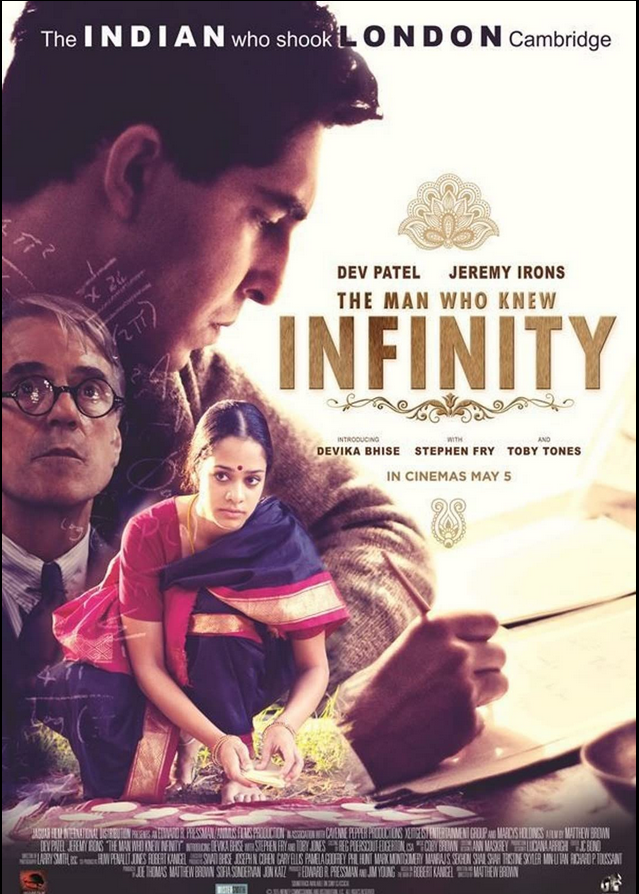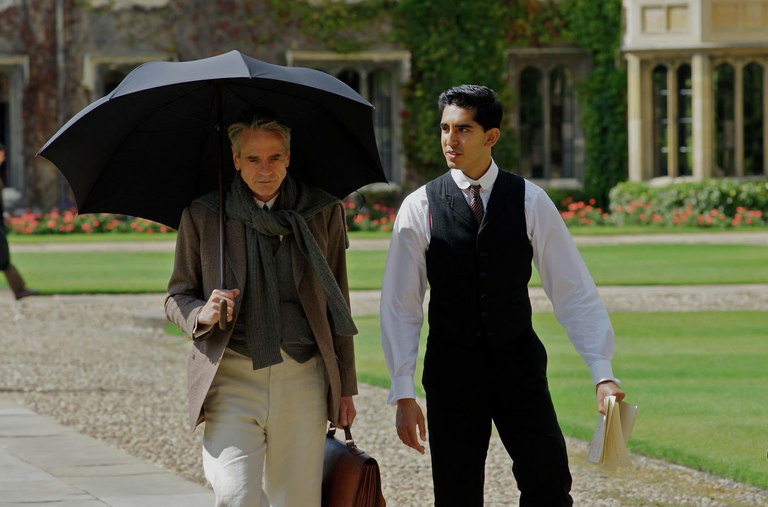
The Man Who Knew Infinity is based on the true story of the Indian mathematician Srinivasa Ramanujan, a young self-taught man who, with minimal academic education in pure mathematics, made extraordinary contributions to the theory of infinity in mathematical analysis, number theory and also to series and continued fractions.
The film stars Dev Patel and Jeremy Irons. The cast also includes Toby Jones, Stephen Fry, Jeremy Northam and Kevin McNally.

El Señor Que Conocía El Infinito está basada en la historia real del matemático hindú Srinivasa Ramanujan, un joven autodidacta que, con una mínima educación académica en lo que a matemáticas puras se refiere, hizo contribuciones extraordinarias a la teoría del infinito en el análisis matemático, a la teoría de números y también a las series y las fracciones continuas.
La película está protagonizada por Dev Patel y Jeremy Irons. El reparto incluye también a Toby Jones, Stephen Fry, Jeremy Northam y Kevin McNally.

In his short life (he died at the age of 32) he was able to elaborate almost 4,000 new mathematical equations, many of them with the Greek number pi, whose value is 3.14 and whose decimal fractions extend to infinity, and to the counter function of prime numbers.
When his discoveries managed to transcend the academic fields of his native India he was called to collaborate with the eminent Professor G. H. Hardy, and during the five years he was at Cambridge he published twenty-one research articles.
Galileo Galilei himself had spoken of the theory of infinity, but it was the German mathematician Georg Cantor at the beginning of the twentieth century who tackled the problem of infinity and showed us how to continue counting when numbers run out.
If we take as an example the aforementioned Greek number pi whose value of 3.141592.... rounded, but we could go on to infinity without finding the exact number. For this reason, Pi is called "irrational number", because it has an infinite number of digits that are prolonged after the decimal point, without ever repeating the same pattern. In the same way, if we want to obtain the square root of 2. The result will be 1.4142.....
Having made this introduction, let's go to the movie.

En su corta vida (falleció a los 32 años) fue capaz de elaborar casi 4.000 ecuaciones matemáticas nuevas, muchas de ellas con epicentro el número griego pi cuyo valor es 3,14 y sus fracciones decimales se extienden hasta el infinito y a la función contador de los números primos.
Cuando sus descubrimientos lograron trascender los ámbitos académicos de su India natal, fue llamado a colaborador con el eminente profesor G. H. Hardy y durante los cinco años que estuvo en Cambridge publicó veintiún artículos de investigación.
El mismo Galileo Galilei había hablado de la teoría del infinito, pero fue el matemático alemán Georg Cantor a comienzos del siglo XX, quien abordó el problema del infinito y nos mostró cómo seguir contando cuando los números se agotan.
Si tomamos como ejemplo el número griego pi, ya citado, cuyo valor de 3,141592... redondeado, pero podríamos seguir hasta el infinito sin encontrar el número exacto. Por este motivo, Pi es llamado "número irracional", porque tiene una infinita cantidad de dígitos que se prolongan tras la coma, sin jamás repetir un mismo patrón. De igual manera, si queremos obtener la raíz cuadrada de 2. El resultado será 1,4142...
Hecha esta introducción, vamos a la película.


The initial plot of the film places us in colonial India at the beginning of the 20th century, exactly in the region of Madras in 1912.
The young mathematician Ramanujan (very well played by Dev Patel, a British actor of Indian origin), who has only attended middle school, writes to the eminent Cambridge professor G. H. Hardy: "Dear Sir, I have not received a university education, but I have followed the ordinary school courses. I have made a detailed study of divergent series in general and the results I have arrived at are described as surprising by local mathematicians."
He intends to go to England to present his knowledge and will have to overcome several obstacles to do so.
Those of his own family in India, highly traditionalist, and an English academic sector that initially mocks him.
However, Srinivasa Ramanujan finds in Hardy (a remarkable performance by Jeremy Irons) a character different from the rest of the academics at Trinity College, Cambridge, since G. H. Hardy is considered an anti-conventionalist and an anti-academic (in the sense that this word was used at the time) who is only concerned with accepting all kinds of new knowledge. And Ramanujan's represent a real revolution in the field of mathematics, because they go beyond the empirical statements of his colleagues.
It is not for nothing that Hardy is a friend of Bertrand Russell, a pacifist and mathematician like Hardy himself, linked to the neopositivism movement, an extroverted figure in the midst of a very conservative and closed academic environment.
In fact, it is exactly Russell (played in the film by Jeremy Northam) who proposes Ramanujan as a new schoolmate to the rest of the student body, trying not only to make everyone appreciate the importance of his work beyond his origins and social status, but also to make that closed and hostile academic environment understand that the differences between the colonizing country and the colonized country do not really exist on a human level.
Although thanks to the influence and his friendship with Hardy and Russell himself, he manages to be accepted in the academic community, which gradually manages to recognize his extraordinary discoveries in the field of mathematics, in the conservative English society of the beginning of the century it will be much more difficult for him to be accepted.
At a certain point, the film hints at a criticism of the "colonialist discourse" of a sector of English society when it refers to the way Srinivasa Ramanujan dresses, behaves and his origins, but it does not dwell too much on this, since the main argument is another, in a country that is suffering the devastating effects of the First World War, with an economy brought to its knees and with a feeling towards the foreigner that it is unable to conceal.
After five years in Cambridge, where he manages to be accepted as a teacher and become part of the prestigious Royal Society, after having illustrated with his famous notebooks all his theories on numbers and infinity, Ramanujan returns to India when he is diagnosed with tuberculosis, dying a year later.

La trama inicial de la película nos ubica en la India colonial a inicios del siglo XX, exactamente en la región de Madrás en 1912.
El joven matemático Ramanujan (muy bien interpretado por Dev Patel, actor britónico de origen hindú) que en cuanto a instrucción ha hecho solo la escuela media, escribe al eminente profesor de Cambridge G. H. Hardy: “Estimado señor: No he recibido educación universitaria, pero he seguido los cursos de la escuela ordinaria. He hecho un estudio detallado de las series divergentes en general y los resultados a los que he llegado son calificados como sorprendentes por los matemáticos locales”
La intención es trasladarse hasta Inglaterra para exponer sus conocimientos y deberá para ello superar varios obstáculos.
Los de su propia familia en India, sumamente tradicionalista, y un sector académico inglés que inicialmente se burla de él.
Sin embargo, Srinivasa Ramanujan encuentra en Hardy (notable interpretación de Jeremy Irons) un personaje distinto del resto de los académicos del Trinity College de Cambridge, ya que G. H. Hardy es considerado un anticonvencional y un antiacadémico (en el sentido que daban a esta palabra en esa época) que solo se preocupa por aceptar todo tipo de conocimiento nuevo. Y los de Ramanujan representan una verdadera revolución en el campo de las matemáticas, porque van más allá de los enunciados empíricos de sus colegas.
No en vano, Hardy es amigo de Bertrand Russell, pacifista y matemático como el mismo Hardy, ligado al movimiento del neopositivismo, una figura extrovertida en medio de un ambiente académico muy conservador y cerrado.
De hecho, es exactamente Russell (interpretado en la película por Jeremy Northam) quien propone a Ramanujan como nuevo compañero del colegio al resto del alumnado, tratando no solamente de que todo el mundo aprecie la importancia de su obra más allá de sus orígenes y de su condición social, sino también de hacer comprender a ese ambiente académico tan cerrado y hostil que las diferencias entre el país colonizador y el país colonizado en realidad a nivel humano no existen.
Si bien gracias a la influencia y a su amistad con Hardy y el mismo Russell logrará ser aceptado en la comunidad académica, que de a poco logra reconocer sus extraordinarios descubrimientos en el campo de las matemáticas, en la sociedad conservadora inglesa de inicios de siglo le será mucho más difícil ser aceptado.
En cierto punto, la película deja entrever una crítica hacia el "discurso colonialista" de un sector de la sociedad inglesa cuando hace referencia al modo de vestir, de comportarse y a los orígenes de Srinivasa Ramanujan, pero no se detiene demasiado en ello, ya que el argumento principal es otro, en un país que está sufriendo los efectos devastadores de la Primera Guerra Mundial, con una economía puesta de rodillas y con un sentimiento hacia el extranjero que no lograr disimular.
Después de cinco años en Cambridge, donde logra ser aceptado como docente y pasar a ser parte de la prestigiosa Royal Society, después de haber ilustrado con sus famosos cuadernos todas sus teorías sobre los números y el infinito, Ramanujan vuelve a la India cuando le es diagnosticada la tuberculosis, falleciendo un año más tarde.


Dev Patel as/como: Srinivasa Ramanujan
Jeremy Irons as/como: G. H. Hardy
Anthony Calf as/como: Robert Alfred Herman
Arundhati Nag as/como: Komalatammal
Devika Bhise as/como: Janaki
Enzo Cilenti as/como: médico
Jeremy Northam as/como: Bertrand Russell
Kevin McNally as/como: Percy Alexander MacMahon
Richard Johnson as/como: Henry Jackson
Stephen Fry as/como: Sir Francis Spring

The film was shot in the same place where the plot unfolds, Trinity College (Cambridge), giving it a remarkable aura of authenticity.
What the film tries to convey is that the protagonist has received an immense and marvelous gift that not even the eminent professors of many great countries of the world have, but he comes from a lost region of India. However, that same gift will end up costing him his life.
As Hardy himself says in one part of the film: "We need demonstrations, we are simply explorers of the infinite in search of absolute perfection".
An impeccable film where sadness and emotion accompanied by a beautiful and melodious musical score make the dialogues often superfluous.

El rodaje de la película se efectuó en el mismo lugar donde se desenvuelve la trama, es decir, Trinity College (Cambridge) dándole de esta manera un aura de autenticidad notable.
Lo que la película intenta transmitir es en definitiva que el protagonista ha recibido un don inmenso y maravilloso que ni siquiera tienen las eminencias catedráticas de muchos grandes países del mundo y si él que viene de una perdida región de la India. Sin embargo, ese mismo don terminará por costarla la vida.
Como dice el mismo Hardy en una parte de la película: "Necesitamos demostraciones, somos simplemente exploradores del infinito en busca de la perfección absoluta".
Una película impecable donde la tristeza y la emoción acompañadas de una bella y melodiosa partitura musical hacen que muchas veces los diálogos sean superfluos.
Traducido con / Translated with: DeepL Translator.
The Man Who Knew Infinity – Official Trailer – Warner Bros. UK

The paragraph separator -adapted- is the property of The Peak Studio to whom I am grateful for the kind permission to use it.
El separador de párrafos -adaptado- es propiedad de The Peak Studio a quien agradezco la gentil concesión de uso.


